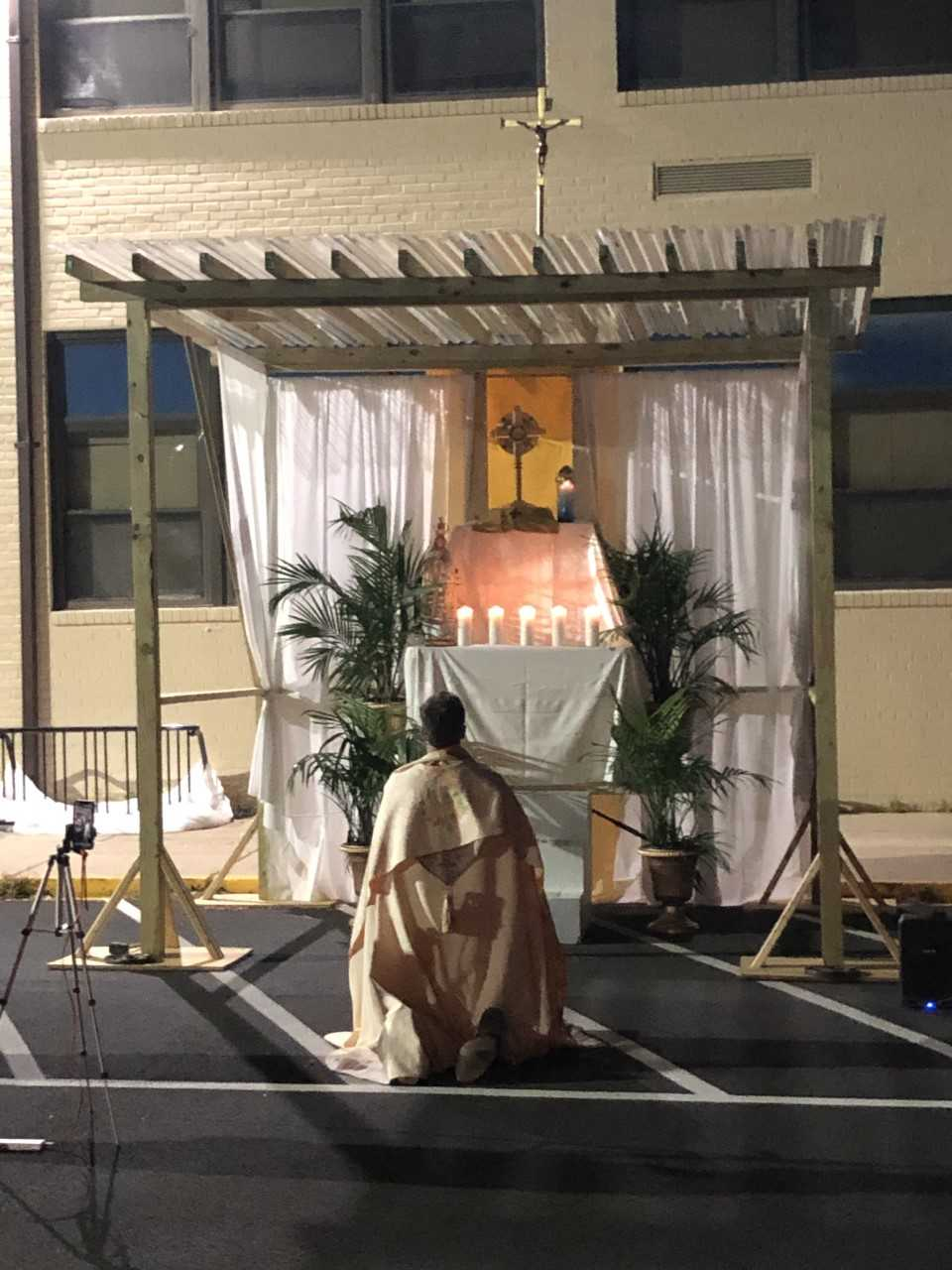Shepherding Online in the Coronavirus Pandemic
Priests use social media to reach their flocks.

Meeting the faithful’s spiritual needs is part of a priest’s call to serve God through the Church. During this pandemic, while public Masses are suspended and gatherings canceled, many priests are turning to social media to spiritually care for their flocks.
When it comes to social media, the coronavirus created an ironic plot twist for Father Jason Signalness, pastor of North Dakota’s Queen of the Most Holy Rosary in Stanley and St. Ann’s in Berthold — he had just given it up for Lent. His master’s thesis while in seminary was actually about opportunities to evangelize through social media. Father Signalness’ own return to the faith from agnosticism began with an email to a cousin who was a priest. It grew into a long-term dialogue that eventually led to an inquiry into the priesthood made online through the diocesan website. After his ordination in 2011, Father Signalness integrated social media into his priesthood.
“I heard from people who saw things I was putting on Facebook,” he said in an interview with the Register. “One person from Bismarck didn’t feel comfortable approaching the Church, but she had many questions, so she messaged them to me. I answered and encouraged her to go back to the parish she had left. She did, and now her whole family is back.”
A video Father Signalness posted on YouTube in December 2017 went viral when, on a whim, he asked: “Alexa, Who Founded the Catholic Church?” But trolls attacking the Church often kept him awake at night trying to come up with just the right answers, so for peace of mind, he took a break from social media during Lent this year. “But then this happened,” he said. “This is where the people are now, so I’m back. Many of the negative voices have quieted during this time, and it has been a good tool to stay connected.”
Masses are livestreamed from Queen of the Most Holy Rosary, and many parishioners have become more active on his Facebook page. “I’ve gotten very busy,” he said. “We are working with parents to continue religion classes, and I have been working with confirmation candidates. My thought is that we will still do it, with one family at a time.” Father Signalness is also using Flocknote, a service that helps churches communicate with parishioners through texting and email.
In the Archdiocese of Washington, Father Shaun Foggo, pastor of Our Lady of Sorrows in Tacoma Park, Maryland, has been livestreaming Mass on Facebook. Since 60% of the parish is Spanish-speaking, daily Mass includes a mixture of both languages. For the Saturday vigil and Sunday morning Mass, one is done in Spanish, and the other is conducted in English.
Father Foggo admits he has never been involved with social media. “My secretary keeps me posted,” he said, referring to communications online. However, he is putting his energy into things like outdoor Eucharistic processions and lighting the Easter vigil candle outside for people to watch from the parking lot, all broadcast on Facebook.

Father Matthew Hood, associate pastor of Divine Child in Dearborn, Michigan, said the parish is using social media to stay connected with the church’s 1,985 families. “We are posting videos with parish updates and little reflections,” he said. In addition to going online with lessons for the parish’s K-12 school, grade-school families take turns leading morning prayers online. “The campus-ministry staff is sharing spiritual resources, and the counseling staff is reaching out,” Father Hood said. “Even the physical-education teachers have switched online.” His parish and others in the Detroit Archdiocese are also on the receiving end of social-media support. “The archdiocese has been communicating with us and holding webinars on issues like finances, and bringing catechism classes home, and advice on the liturgy and anointing of the sick,” Father Hood said.
When Divine Child used social media to announce its “Porch Ministry” to help parishioners who should not be going out shopping, around 40 people volunteered to help. But since the elderly are not on Facebook and do not get emails, volunteers called around 600 parishioners to get in touch by phone with older parishioners. “They touched base, letting them know their parish is here for them,” Father Hood said. “Sometimes they just had conversations with people with limited social spheres and prayed for their intentions and prayed with them.” More than $5,000 in money, gift cards and free dinners from restaurant have been donated to help those that are also in financial need.
Father Blake Britton, parochial vicar at St. Mary’s Catholic Church and school in Rockledge, Florida, is hitting social media hard.
“We had used basic social media to connect with parishioners and school families, but nothing too significant,” he said. “That has all changed now.”
In January, they assembled an evangelization team to release a new media program in May, but the pandemic pushed everything up. “I called the members of the newly formed evangelization team and told them we had 72 hours to complete a four-month project,” he said. “Our mission was to create a vibrant, orthodox, beautiful and inspiring media presence for the daily enrichment of our people.” In less than three days, they began livestreaming Masses, Eucharistic Holy Hours, Stations of the Cross on Fridays during Lent and now Stations of the Light during the Easter season, daily audio recordings of homilies and hosting interactive Facebook Live Q&A sessions. “Our parishioners are asking that we maintain our social-media programs even after the crisis is over,” Father Britton said. “So it looks like our newly formed evangelization team is here to stay.”
The pandemic also inspired Father Britton and his good friend, Brandon Vogt, content director with Word on Fire, to launch their “The Burrowshire Podcast” earlier than planned. On it, the two friends share conversation about faith, culture, books and the spiritual life.
When a Holy Week retreat by University of Mary president Msgr. James Shea scheduled for the Church of the Epiphany in Coon Rapids was canceled, he came up with an alternative: hold a virtual Holy Week Masses and retreat, “From Shadows Into the Light: Gaining the Eyes of Faith.” Msgr. Shea wrote a new opening talk and adapted the others to present a seven-part, online series on the gift of faith in these times, given from Our Lady of Annunciation Chapel on campus.
“People say we live in an unprecedented time,” Msgr. Shea said in an interview. “Yes, it’s unprecedented in a sense; and in another sense, it is not unprecedented at all for whole societies and individual lives to be thrown into chaos. It has happened throughout the history of the human race.” Christianity was made for a time like this, according to him.
“These circumstances are a call to deeper faith that holds at the center the cross of Christ, which shines most brightly during times of suffering and uncertainty,” he said. “The cross of Christ means that Jesus was infected with the diseases of the world and conquers them from within. His blood holds the vaccine.”
Seeing these circumstances through the eyes of faith, he explained, is also seeing how God is taking care of us, even during heartbreaking circumstances. The virtual retreat talks are an example. “They were written for one parish in Minnesota, and, now, they are available to a much wider audience. Even in the midst of the heartbreak from being away from the sacraments, God is also taking care of us during this time.”
Patti Armstrong writes from North Dakota.
- Keywords:
- coronavirus
- mass online
- patti armstrong
- priests
- social media


















